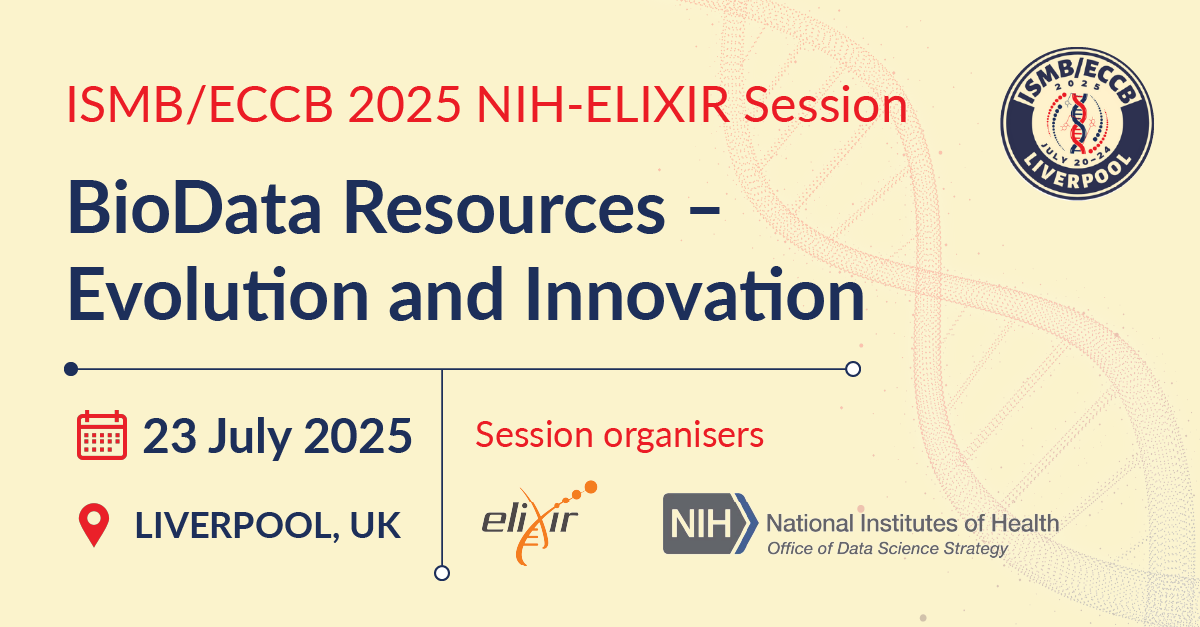ISMB Liverpool
Liverpool
L3 4FP
United Kingdom
Join us for the NIH-ELIXIR session at ISMB/ECCB 2025, focusing on BioData Resources – Evolution and Innovation. Building on the 2023 theme, The Biodata Ecosystem, this year’s session will explore how biodata resources balance the need for long-term stability with the drive for scientific and technical innovation.

Session overview
Biodata resources are essential to life science research, providing the infrastructure that supports data sharing, analysis, and discovery. However, maintaining reliable, long-lived services while adapting to rapidly changing scientific and technological landscapes presents an ongoing challenge.
This session will bring together leading experts to examine how biodata resources are evolving to meet these demands. Through a series of insightful talks and discussions, we will explore how resource managers are driving innovation, ensuring sustainability, and addressing emerging needs in the global scientific community.
- Structuring Meaning: Ontologies and Knowledge Graphs in the Biodata Ecosystem
Ontologies and knowledge graphs are foundational to ensuring that biodata resources are findable, interoperable, and adaptable to scientific innovation. This session highlights leading initiatives that embed semantic frameworks into the heart of biomedical data infrastructures. - Under the Hood: Building Scalable and Sustainable Biodata Infrastructure
Robust, scalable infrastructure is the engine that powers modern biodata resources – enabling everything from efficient data delivery to the integration of advanced analytical tools. This session delves into the evolving technical foundations that support biodata platforms at scale, with a focus on strategies that balance innovation, performance, and sustainability. - Demonstrating Value: Funding Models, Impact, and Engagement in Biodata Resources
Biodata resources are essential to the global life sciences research ecosystem, but their long-term sustainability depends on more than technical excellence – it requires clear demonstrations of value, alignment with evolving user needs, and innovative funding strategies. This session brings together diverse perspectives on how biodata infrastructures can remain responsive and resilient in resource-constrained environments.
What to expect
- Strategies for building and modernising shared infrastructures: Learn how resource managers are updating and improving existing platforms to meet growing user demands.
- Balancing innovation and sustainability: Explore approaches to fostering technical and scientific progress while managing operational and financial challenges.
- Assessing impact and value: Discover how the value and influence of biodata resources are measured and communicated.
- Meeting evolving user needs: Hear about novel solutions and best practices for adapting to the changing requirements of researchers and the broader life science community.
Who should attend
This session is designed for biodata resource managers, researchers, infrastructure developers, and policy makers who are interested in the future of biodata management and innovation. Whether you manage a core facility, develop new tools, or use these resources in your research, this session will provide valuable insights and practical strategies.
Join us to engage with leading voices in the field and contribute to the conversation about the future of biodata resources!
Agenda
| Time | Session title | Speaker |
|---|---|---|
| 11:20–13:00 Ontologies and knowledge graphs in the biodata ecosystem |
Disease ontology knowledgebase: A global bioData hub for FAIR disease data discovery | Lynn M Schriml (University of Maryland School of Medicine, Institute for Genome Sciences) |
| From microbes to molecules: How DSMZ digital diversity integrates diverse datasets into a unified framework | Julia Koblitz (Leibniz Institute DSMZ – German Collection of Microorganisms and Cell Cultures) | |
| Metabolomics workbench: Data sharing, analysis and integration at the National Metabolomics Data Repository | Mano R Maurya (Department of Bioengineering, University of California, San Diego) | |
| Building sustainable solutions for federally-funded open-source biomedical tools and technologies | Karamarie Fecho (Copperline Professional Solutions, LLC; Renaissance Computing Institute, University of North Carolina at Chapel Hill) | |
| SEA CDM: An ontology-based common data model for standardizsng and integrating biomedical experimental data in vaccine research | Yongqun “Oliver” He (University of Michigan Medical School) | |
| 13:00–14:00 – Lunch break | ||
| 14:00–16:00 Building scalable and sustainable biodata infrastructure |
Insights from GlyGen in developing sustainable knowledgebases with well-defined infrastructure stacks | Kate Warner (The George Washington University) |
| The evolution of Ensembl: Scaling for accessibility, performance and interoperability | Mallory A Freeberg (EMBL-EBI) | |
| Production workflows and orchestration at MGnify, ELIXIR’s Core Data Resource for metagenomics | Martin Beracochea (EMBL-EBI) | |
| Flexible hybrid cloud infrastructure enabling innovative use and long-term sustainability of biomolecular data and reference maps in HuBMAP and SenNet | Philip D Blood (Pittsburgh Supercomputing Center, Carnegie Mellon University and University of Pittsburgh) | |
| A SCALE-Able approach to building "hybrid” repositories to drive sustainable data ecosystems | Robert Schuler (University of Southern California, Information Sciences Institute) | |
| 16:00–16:40 – Coffee break | ||
| 16:40–18:00 Funding models, impact, and engagement in biodata resources |
Meeting user expectations in a resource constrained environment: Europe PMC’s approach | Melissa Harrison (EMBL-EBI) |
| Coopetition as a catalyst for researcher engagement with open data | Mark Hahnel (Digital Science) | |
| Evaluating the impact of biodata resources: Insights from EMBL-EBI’s impact assessments | Eleni Tzampatzopoulou (EMBL-EBI) | |
| Beyond citations: Measuring the economic and scientific impact of UniProt in the biodata ecosystem | Alex Bateman (EMBL-EBI) | |